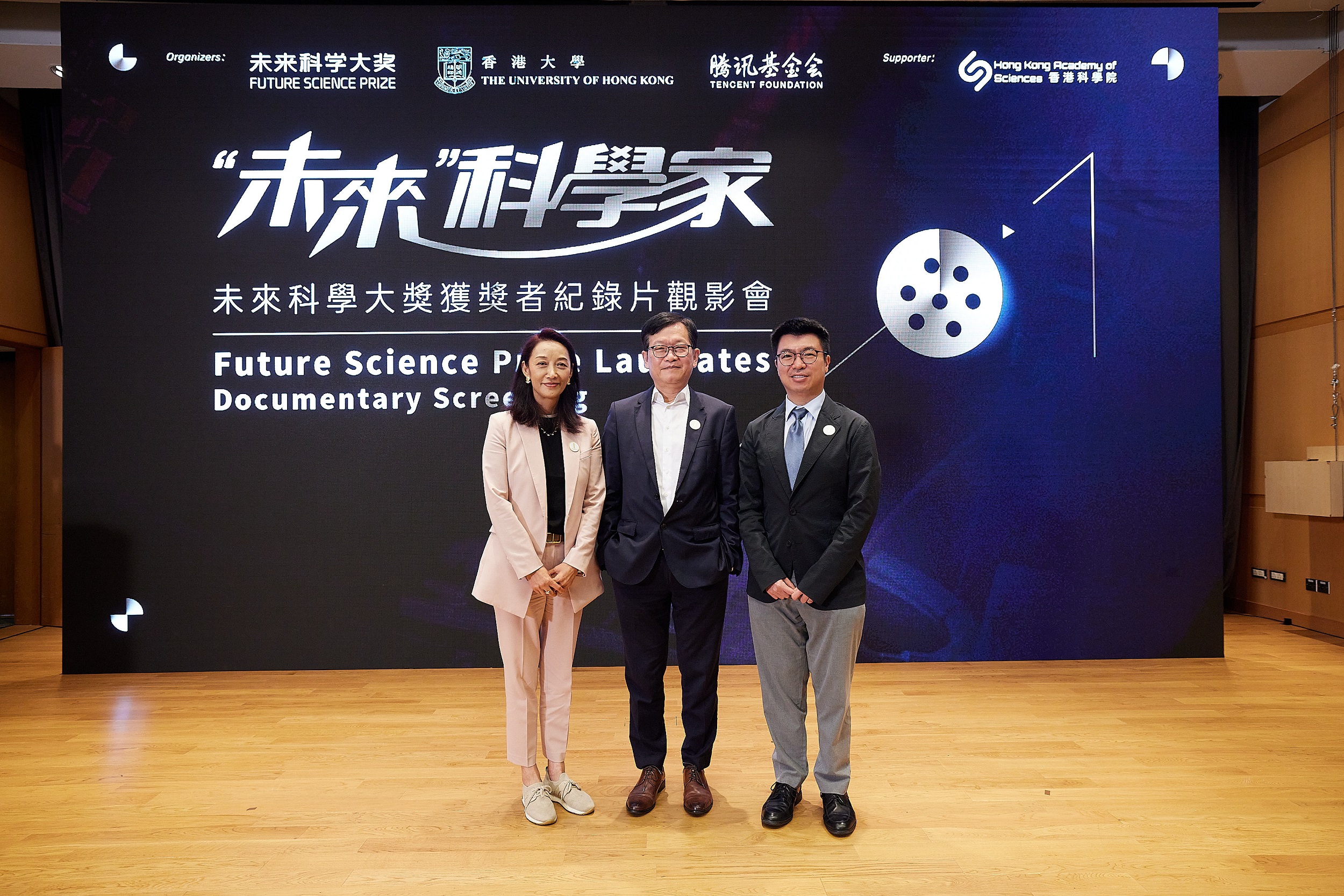
12 June 2023

The Future Science Awards Foundation has announced that the “2023 Future Science Prize” Award Ceremony and an array of events under “2023 Future Science Prize Week” will be held in Hong Kong for the first time in October this year. In line with this world-class annual science event, the organiser will hold a series of activities in Hong Kong to build a global platform for scientific exchange, to generate enthusiasm for science in the community, and to inject impetus into Hong Kong’s science and innovation development.
As the first signature event of “2023 Future Science Prize”, the “Future Science Prize Laureates’ Documentary Screening” was held on Saturday (June 10) at the University of Hong Kong (HKU) with attendance of Ms Cathy Wu, Initiator of Future Forum and Secretary General of The Future Science Awards Foundation; Professor Mok Ngai-ming, 2022 The Mathematics and Computer Science Prize Laureate and Edmund and Peggy Tse Professor in Mathematics, Chair of Mathematics, Director, Institute of Mathematical Research of HKU; Ms Isabella Wong, Associate Vice-President (China Affairs) of HKU; Professor Anderson Shum, Associate Vice-President (Research and Innovation) of HKU; Mr James Li, Tencent Vice President of Public Affairs and Tencent Foundation Executive Director and members of Programme Committee of “2023 Future Science Prize Week”, including Professor Yang Tong, Chair Professor of Mathematical Science of the Hong Kong Polytechnic University (PolyU) and Professor Vivian Yam, Philip Wong Wilson Wong Professor in Chemistry and Energy and Chair Professor of Chemistry of HKU.
Ms Cathy Wu, Secretary General of The Future Science Awards Foundation, said: "There are no borders in the world of science. Over the past eight years, 27 laureates have been awarded the Future Science Prize, whose scientific research and achievements are all rooted from the Greater China region and have enormous international influence and contribution to mankind. The Future Science Prize will announce the laureates’ list for 2023 in August, followed by an Award Ceremony at the Hong Kong Palace Museum on 17 October. 2023 Future Science Prize Week will also take place from 14 to 17 October with nearly a hundred top-notch scientists from 9 countries around the world gathering in Hong Kong to exchange views on frontier technology and bringing the latest development in the field of science to Hong Kong with an aim to develop a platform for scientific exchange and cooperation amongst Hong Kong, Greater Bay Area and the international community.”
Professor Mok Ngai-ming, 2022 The Mathematics and Computer Science Prize Laureate and Chair of Mathematics of HKU said: "I feel indebted to the Future Science Foundation for their recognition of the value of fundamental research in mathematics towards progress in science, and of my individual global perspective on problem solving in mathematics cross-fertilising ideas from complex analysis, differential geometry, algebraic geometry and number theory. The search for beauty and benevolence that binds truth-seekers in mathematics across generations will continue to enable the flourishing of mathematics and its innumerable applications to scientific development."
Professor Mok added: “Never underestimate your ability to acquire advanced knowledge at your secondary school stage. When I was a secondary school student, I often self-studied advanced mathematics during my spare time and made use of local resources, such as the library in my secondary school and Hong Kong City Hall, where I often visited. Through studying at the library, I learned different types of mathematical thinking and found out what problems others were discussing, which helped me greatly in becoming a mathematician. Being recognized by the Future Science Prize today is of great significance to me.”
Professor Anderson Shum, Associate Vice-President (Research and Innovation) of HKU said: "The Future Science Prize is a major event in the scientific community. With the opportunity to organize it in Hong Kong, young people, researchers and the general public can be exposed to top-notch science. As a top institution renowned internationally for cultivating talents, The University of Hong Kong is committed to co-organizing various activities related to the Prize, thus promoting the exchange of international scientific talents, deepening the international community's understanding of the country's scientific development and achievements, and to arouse enthusiasm for science in the Hong Kong community.
The Future Science Awards Foundation will co-organise the "Asian Young Scientist Fellowship Annual Conference" with HKU in October this year and 12 laureates of the "Asian Young Scientists Project Fund" in 2023 from top universities in Japan, South Korea, Singapore and China will be invited to attend the Conference to present their research findings. At the same time, approximately 300 young scientists, entrepreneurs, investors, business leaders and educators from Hong Kong, Mainland and other parts of the world will be invited to participate in the Conference, allowing these young elite scientists to discuss how to leverage science in tackling major issues that mankind is currently facing.
Established in 2016, the “Future Science Prize” has been recognised by "Nature", an international science journal, as "China's Nobel Prize”. It is established to reward scientists who have made outstanding scientific achievements in the Mainland, Hong Kong, Macau and Taiwan, enabling the world to know about their great contributions to the scientific community and demonstrating China’s spirit and culture of science to the world.
The "Future Science Prize" consists of three categories, namely “The Life Science Prize”, “The Physical Science Prize”, and “The Mathematics and Computer Science Prize”, which are all professionally evaluated by the Scientific Committee composed of 23 outstanding scientists, upholding the principles of fairness, impartiality and trust.
